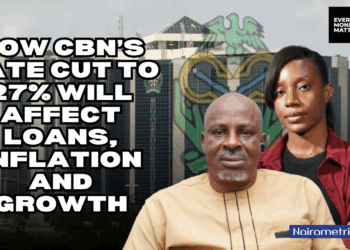Controlling Nigeria’s rising rate of population growth has been suggested as a possible panacea to the country’s high inflationary pressure. This is according to a report prepared by Bode Agusto, titled: “Nigeria – Exchange Rate Management.”
According to the report, which analyzed the movement of Nigeria’s exchange rate against the US Dollar amidst rising inflation rate, the better management of the population and improved productivity will help reduce the long-term inflation in Nigeria.
According to the World Bank, Nigeria’s population stood at 211.4 million as of the end of 2021, a 2.6% increase compared to 206.14 million recorded a year ago, indicating that Nigeria’s population increased by over 5 million people in one year.
An excerpt of the report reads: “Nigeria adds five million people to her population every year. This results in a significant increase in demand for food, housing, clothing, healthcare, and other things. In addition to this, over 22 million Nigerians, willing and able to work, are unemployed. We believe that If Nigeria is better able to manage her population growth (demand) and can get a greater proportion of her people to work and produce (supply) she can reduce long-term inflation significantly.”
On exchange rate
The report also highlighted the downside to the currently adopted managed floating exchange rate system by the Central Bank of Nigeria, noting that only countries that earn a lot of US dollars can effectively adopt a pegged exchange rate system.
- “Countries that earn a lot of USD may peg their currencies to the USD. The most prominent examples are the oil-rich countries of Saudi Arabia (since 2003) and Qatar (since 2001) but there are others like Panama (since 1904) and Belize (since 1978). All these countries would sell USD to willing buyers at the exchange rates they have set.”
- “Can Nigeria sell USD at N420/$1 to all those who want to buy? The fact that Nigeria cannot has led to the development of a parallel market that commands a large premium. At N420/$1, everyone wants to buy USD from the Central Bank of Nigeria (CBN) but no one wants to sell it. This means that a rate of N420/$1 is below equilibrium and is unsustainable. Nigeria has tried several times in the past to peg the NGN to the USD and has failed every time.”
The study however recommended a crawling peg exchange rate system. “This means that a country starts at a near market LCY/USD exchange rate and then allows its currency to depreciate (or appreciate) against the USD by close to the difference in annual inflation. This is the option we recommend for Nigeria.”
- “Today, this means starting at a NGN/USD exchange rate of around N600/$1 and then allowing the currency to depreciate by around 10% per year. It also means allowing knowledgeable willing buyers to do business with knowledgeable willing sellers at contracted rates. The CBN may intervene in the market when rates are significantly higher or lower than its target. Kenya and Botswana have successfully managed their exchange rates for a number of years using this option.”


























Population is not the issue, let’s stop making excuses. India has a population of 1.41 billion (they added 10 million from last year) with an exchange rate of 79 rupees to the dollar while China has a population of 1.42 billion with an exchange rate of 6.7 yuan to the dollar. The main differences between us and them is stable and affordable power supply, human capital and industrial capacity to be an export economy (and not just exporting raw materials).
You can’t fintech or print your way out of this, there needs to be a steady power (no economy can progress without this), strong manufacturing base and working refineries at least, it’s a shame that Nigeria imports all sorts of fuel (like jet fuel that is causing flight prices to peak) when we have the crude oil, imagine being the main supplier of all types of fuel to other nations of Africa alone.
The educational system is another issue, and our best end up leaving to develop other nations. I do not have the answers but I do know that with steady power, strong manufacturing and refineries there would be a huge difference. I doubt any of that will happen in my generation but it would be a pleasant surprise. There’s a lot of work to be done to really be the ‘Giant of Africa’.
I totally agree with your write up. Ernst & Agusto missed the point when it concluded that the problem with our Inflation was with population. The same foreign colonialist mentality on keeping Nigeria down perpetually.
In the 80s the IMF came with SAP as the panacea for the woes Nigeria was facing. Without much critical analysis and with the Military boots on the citizens’ heads, the policy was swallowed Hook, Line and Sinker. It was implemented. Result: total failure. Our woes were multiplied post implementation. They have come again through Ernst & Agusto. This time using Population as the platform to further exacerbate our situation. If population was the issue in managing Inflation, China with a population of almost 1.5 billion peoples would not have reversed the self imposed policy of ONE CHILD family. Population is not the problem.
Corrigendum: Bode Agusto intended and not Ernst Agusto that was mistakenly written. My apology on this mistake.
First, the Augusto report seems to point to galloping population growth as ONE factor 9not the only factor) in Nigeria’s inflation – and of course that entirely CORRECT. One does not need an economics degree to grasp that MORE people chasing after the same amount or depleting number of resources and goods will engender inflation.
Furthermore, Nigerian chattering class should quit this MISGUIDED obsession with exchange rates. The Kuwaiti Dinar is the world’s “strongest” currency (stronger than the dollar, pound or yen), but Kuwait is an economic lightweight that produces virtually nothing (sans crude oil). Meanwhile, a “weak” currency can actually be an ECONOMIC STRENGTH (ask China) if you have a PRODUCTIVE economy.
Accordingly, Nigeria’s problem is NOT a weak Naira, but rather a low PRODUCTIVE base that necessitates unnecessary imports (btw, increased PRODUCTIVITY would also ameliorate the strains of galloping population growth). Ordinarily, the more expensive imports get, the more that should be an INCENTIVE for domestic import substitution. Unfortunately, most Nigerians are too busy wailing to understand that economic challenges are the flip side of ECONOMIC OPPORTUNITIES!
>
You are correct. We are basically saying the same thing. Nigeria and Africa as a whole needs to be more productive. The Western nations are aging nations but Africa has youth on our side. But we need the skills to take advantage of this and the only sure way is to learn from the best just like how China, India and Japan did to industrialize their economies.
Complaining and blaming won’t change much. We recognize where the problems are, we have to ask ourselves what are we going to do about it. The fact that Africa is so underdeveloped presents numerous opportunities to benefit those who take this on (as I am striving daily to do) and Africans as a whole.
Like I stated in my original comment, it’s a very long road with obstacles ahead but we have to try; there’s so much work to be done. No one is coming to save us (I don’t bother myself with popularity contests/elections) but we might get help or favor along the way.